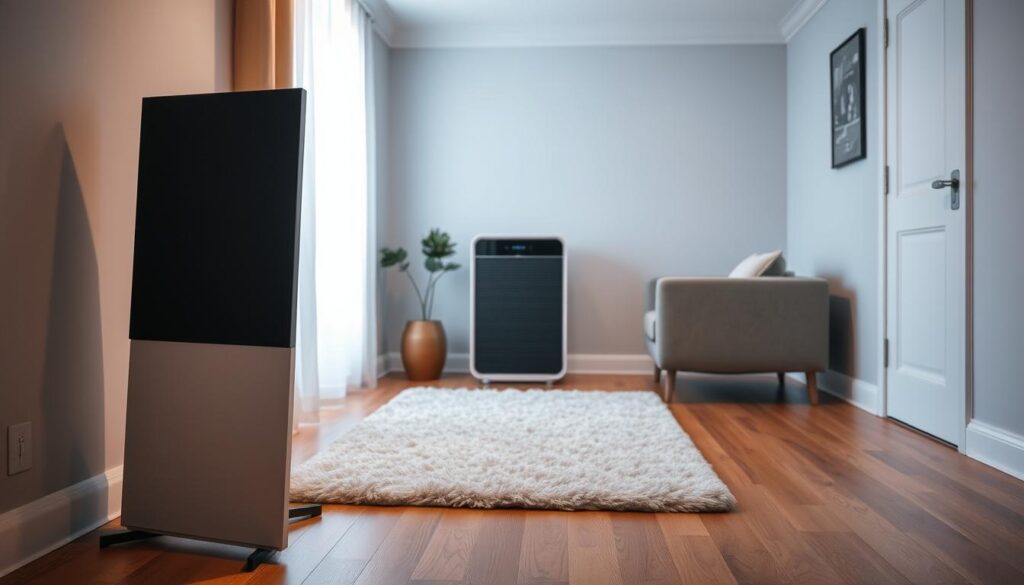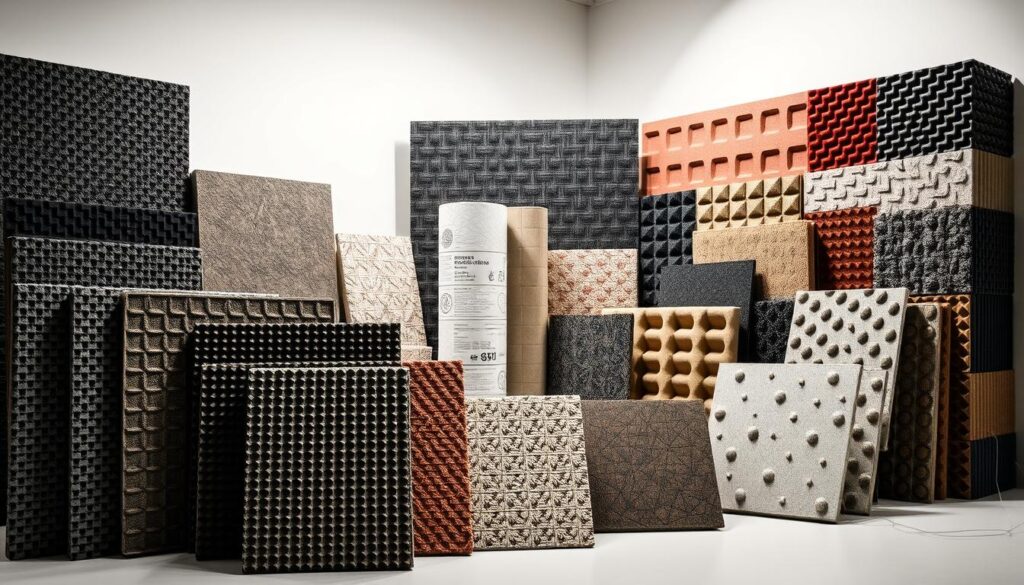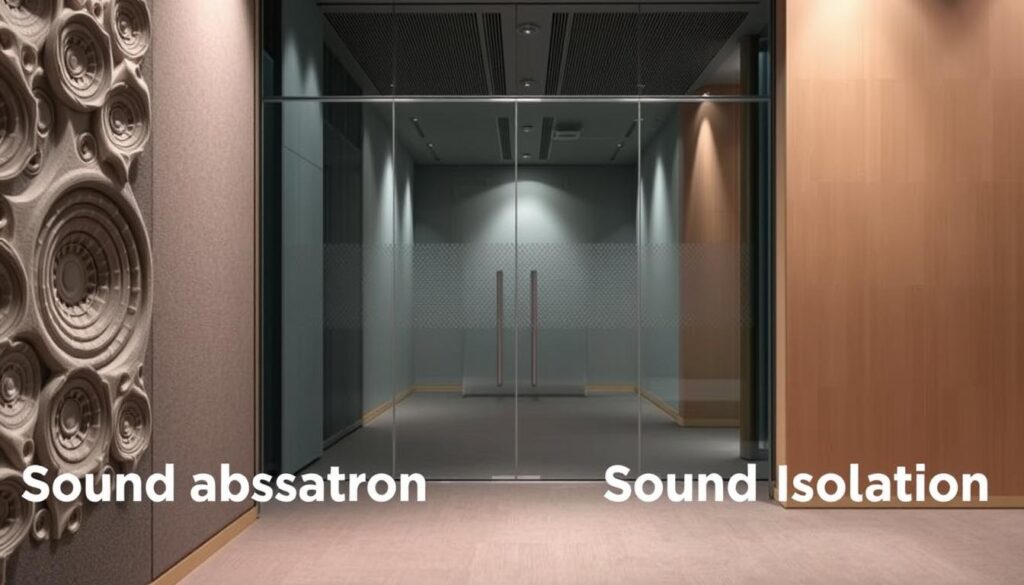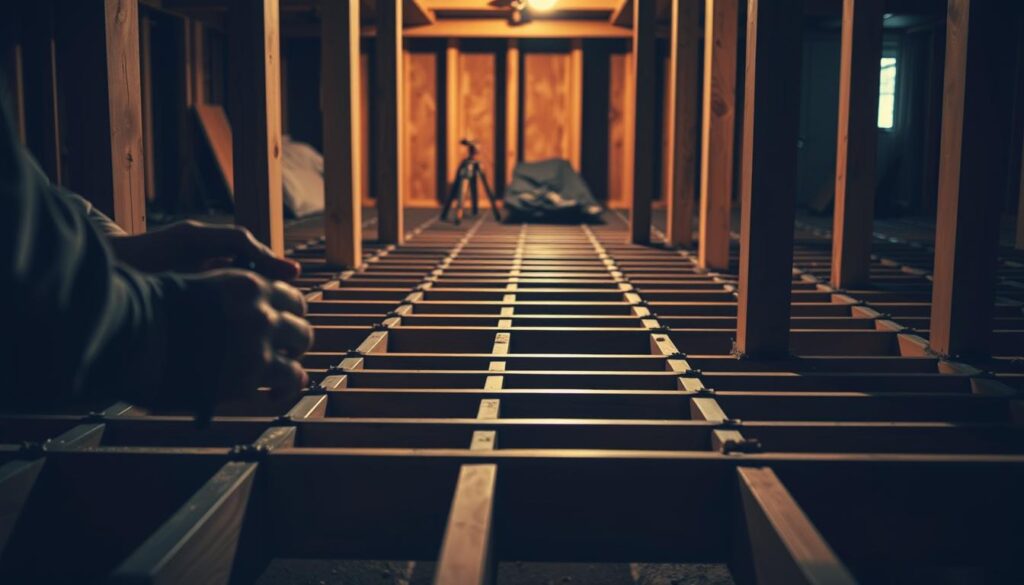As a homeowner, you know your house makes many sounds. Identifying the sources of these noises is key to keeping your home healthy. From simple creaks to serious problems, knowing what causes noise is vital.
To reduce noise and make your home quieter, use noise reduction tips and noise-cancelling techniques. This article will cover common noise sources, their causes, and effective household noise solutions. We aim to help you tackle specific noise problems in your home.
Understanding Common Household Noise Sources
To have a quieter home, you need to know where the noise comes from. Most people can handle outside sounds like airplanes or kids playing. But, the noises inside your home can really get on your nerves. The good news is, you can fix most of these sounds without spending a lot of money or time.
Identifying the Noises in Your Home
It’s important to figure out what noises you’re dealing with. Common sounds include creaking floors, popping or cracking noises, and hissing or running water. Pay attention to when and how often these sounds happen.
- Creaking floors can be due to the house settling or worn-out floorboards.
- Popping or cracking noises might be related to heating or cooling systems.
- Hissing or running water sounds could indicate issues with your plumbing.
Knowing what kind of noises you have helps you find the cause.
Why Noise Levels Vary Throughout the Day
Noise levels in your home change a lot during the day. In the daytime, appliances, footsteps, and outside traffic make it louder. At night, it might be quieter, but sounds like creaking floors or a humming fridge can stand out more.
Factors influencing daily noise variations include:
- Household activity: More people moving around during the day.
- Appliance usage: Different appliances operating at different times.
- Outside noise: Traffic, neighbors, and other external sources.
By understanding these patterns, you can use quiet home strategies and soundproofing advice to make your home quieter and more peaceful.
Footfall Noise: Walking Sounds from Above
Many people struggle with the sound of footsteps from above. This noise can really disrupt your peace at home. Knowing why it happens and how to fix it can make a big difference.
Common Causes of Footfall Noise
Footfall noise often comes from creaking floors or loose boards. It can also be due to poor soundproofing between floors. Changes in temperature and humidity, and a house settling, can also cause these sounds. Finding out why it happens is key to solving the problem.
Solutions for Reducing Impact Sounds
There are ways to lessen footfall noise. Area rugs or acoustic panels on floors and ceilings can help a lot. Also, adding soundproofing materials like mass-loaded vinyl works well.
| Soundproofing Material | Effectiveness | Cost |
|---|---|---|
| Mass-Loaded Vinyl | High | Moderate to High |
| Acoustic Panels | Moderate to High | Moderate |
| Area Rugs | Moderate | Low to Moderate |
Soundproofing Techniques for Floors
Soundproofing floors means using special materials and methods. For example, resilient channels or sound-absorbing underlayment can really help. Resilient channels, for instance, can decouple the finish flooring from the structural elements, reducing sound transmission.
https://www.youtube.com/watch?v=GLjhrXFo0Kw
By understanding footfall noise and using these solutions, you can make your home quieter. Whether it’s simple steps like area rugs or more complex soundproofing, you can reduce noise.
Plumbing Gurgles: The Mystery of Household Pipes
Gurgling noises from your plumbing system can be a sign of underlying issues. These sounds can be unsettling and often indicate problems that need to be addressed. Understanding the causes of these noises is crucial to maintaining a quiet and functional plumbing system.
What Causes Gurgling Noises?
Gurgling noises in your pipes are typically caused by air trapped in the plumbing system or blockages that obstruct the normal flow of water. When water tries to flow past these blockages, it can create gurgling or bubbling sounds. Air in the pipes can enter through loose connections or during maintenance work. Also, improperly vented plumbing systems can lead to gurgling noises as air gets trapped.
Diagnosing Plumbing Issues
To diagnose plumbing issues, start by identifying when the gurgling noises occur. If the sounds happen when you’re using a particular faucet or appliance, it could indicate where the problem lies. Checking for visible signs of leaks or water damage can also help pinpoint the issue. Inspecting your pipes for any blockages or damage is essential.
- Check for loose connections or vent pipes that might be clogged.
- Inspect your pipes for signs of damage or corrosion.
- Consider using a drain snake to remove any blockages.
Steps to Minimize Pipe Noises
Minimizing pipe noises involves a combination of maintenance and potentially some DIY fixes. Start by checking your pipes for any blockages or damage. Using noise-reducing materials around your pipes can also help. For persistent issues, consider consulting a professional plumber to assess and fix the problem.
Some effective noise reduction tips include:
- Installing pipe insulation to reduce noise.
- Securing loose pipes to prevent rattling sounds.
- Using anti-vibration mounts for noisy appliances.
By understanding the causes of plumbing gurgles and taking proactive steps to address them, you can create a more comfortable and quiet home. Implementing quiet home strategies and noise-cancelling techniques can significantly enhance your living environment.
Refrigerator Hum: The Ever-Present Background Noise
The hum of your refrigerator can be really annoying. It’s a common noise in many homes. This sound can make quiet places feel noisy.
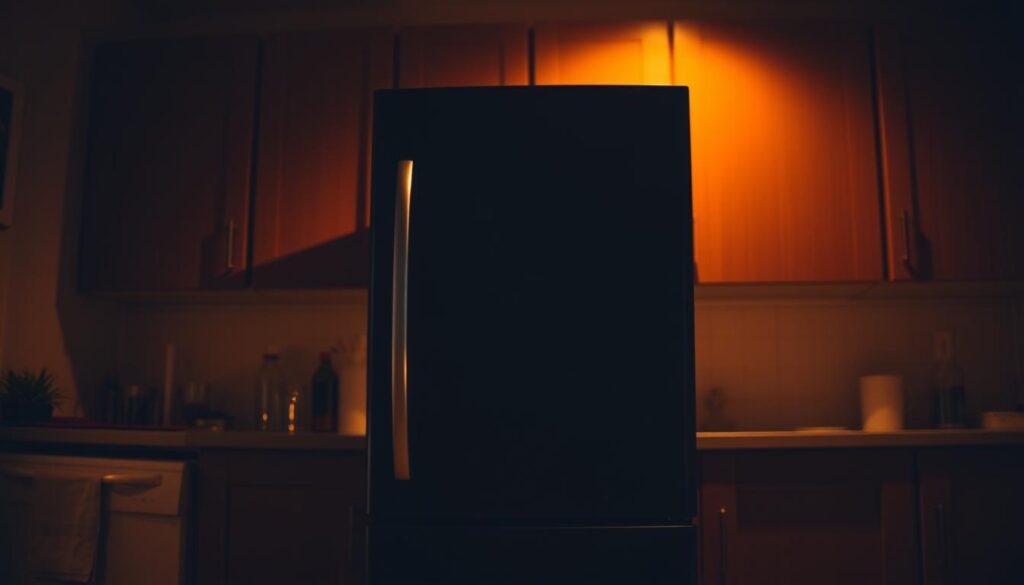
Causes of Refrigerator Noise
Refrigerators make noise because of parts inside. The main culprits are the compressor, condenser fan motor, and evaporator fan motor. Knowing what these parts do can help you figure out why your fridge is noisy.
- The compressor is at the back or bottom. It compresses refrigerant, causing humming or vibration.
- The condenser fan motor, near the compressor, cools coils. A bad or dirty fan can make strange noises.
- The evaporator fan motor, in the freezer, moves cold air. A broken or frosty fan can make more noise.
When to Worry About Refrigerator Sounds
Some fridge noise is normal, but loud or unusual sounds mean trouble. Clicking, grinding, or very loud humming might mean a part is broken or not installed right.
| Noise Type | Possible Cause | Action |
|---|---|---|
| Loud Humming | Faulty compressor or condenser fan | Check and clean the condenser coils, or call a technician |
| Clicking or Ticking | Defrost timer or faulty relay | Inspect the defrost timer and relay, consider replacement |
| Grinding or Rattling | Evaporator fan or loose parts | Tighten loose parts, or replace the evaporator fan |
Tips to Reduce Refrigerator Hum
To cut down fridge noise, first check if it’s installed right and level. Keeping it clean and checking for worn parts can also help.
- Check the compressor and condenser fan: Make sure they’re clean and working right.
- Inspect the evaporator fan: It should be clean and not blocked by frost or food.
- Use noise-reducing materials: Anti-vibration pads under the fridge can lessen noise.
- Regular maintenance: Get regular checks to keep your fridge running smoothly.
Knowing why your fridge hums and taking steps to fix it can make your home quieter. Using these household noise solutions and soundproofing advice can really help manage annoying sounds.
Noise from Heating and Cooling Systems
Knowing what sounds your HVAC system makes can help you spot problems early. Noise from heating and cooling systems can really disrupt a home.
Understanding HVAC Sounds
HVAC systems can make many different sounds, from a soft hum to loud bangs. It’s important to know what noise you’re hearing and why. For example, rattling might mean loose parts, while hissing could mean a duct leak.
Common Noises – What They Mean
Each sound from your HVAC system can point to a different problem. A banging or clanking sound is usually a big deal and might mean mechanical or duct issues. But, a steady hum is usually okay unless it’s too loud or changes pitch.
- Rattling or clanking noises often suggest loose parts or debris within the system.
- Hissing sounds can indicate a leak in the ductwork or refrigerant issues.
- Pulsating or vibrating noises might be due to improper installation or an unbalanced fan.
Effective Solutions for HVAC Noise
To cut down on HVAC noise, several steps can help. Regular maintenance is crucial to avoid many problems. This includes checking for loose connections, inspecting pipes for damage, and making sure all parts are secure.
Also, using noise-reducing materials around the HVAC system or in the ductwork can help. For bigger problems, getting a pro to check and fix or replace the system might be needed.
Outdoor Noises Impacting Indoor Peace
Outdoor noise can really mess up the quiet in your home. Many things outside can make it hard to relax. It’s key to know where these noises come from and find ways to lessen them.
Identifying Outdoor Noise Sources
First, pay attention to the sounds you hear and when. Traffic noise is loudest during busy times, while neighborhood sounds are constant. A study on noise pollution says knowing the source is key to fixing it noise pollution research.
Landscaping to Buffer Noise
Choosing plants for noise reduction is important. Look for dense, tall plants with thick leaves. Trees and shrubs work well together. Adding fences or walls can also help block noise.
Installing Sound Barriers
When putting up a sound barrier, think about cost, looks, and local rules. Make sure it doesn’t block views or lower property value.
| Technique | Description | Effectiveness |
|---|---|---|
| Landscaping | Strategic planting to absorb or block noise | High |
| Sound Barriers | Installing barriers to block noise | High |
| Sealing Gaps | Sealing gaps around windows and doors | Medium |
By figuring out where noise comes from, using plants to block it, and setting up sound barriers, you can make your home quieter. These steps can make your living space more peaceful and comfy.
The Role of Materials in Sound Transmission
Knowing how materials affect sound is key to a quiet home. The materials in your home greatly influence the noise levels. By changing these materials, you can make your home quieter and more peaceful.
Evaluating Your Home’s Materials
To control sound, check your home’s materials. Look at walls, floors, and ceilings for soundproofing chances. Materials like brick and concrete block sound better than drywall.
Soundproofing with Acoustic Panels
Acoustic panels are great for cutting down echo and sound. They soak up sound waves, making rooms quieter. Place them in noisy spots to improve your home’s sound.
The Benefits of Area Rugs and Cushions
Area rugs and cushions also help quiet your home. They soften footsteps and reduce floor noise. Use them in busy spots to add to your home’s quietness.
Understanding materials and using soundproofing can make your home peaceful. These quiet home strategies help manage noise, making life better.
Behavioral Changes to Minimize Noise Perception
By making a few simple changes, you can greatly reduce how much you notice household noise. Adopting new habits and being more aware of your surroundings can make your home quieter and more peaceful.
Adjusting Your Daily Routine
Changing your daily routine is a powerful way to cut down on noise. Try to avoid loud places when they’re busiest. Or, use noise-cancelling headphones to help you focus or relax.
For example, plan quiet activities like sleeping or working when it’s less noisy. Also, setting up a quiet room or area can be a peaceful retreat from the noise.
| Daily Routine Adjustment | Benefit |
|---|---|
| Avoiding noisy areas | Reduces exposure to peak noise times |
| Using noise-cancelling headphones | Enhances focus and relaxation |
| Creating a quiet zone | Provides a peaceful sanctuary |
Mindfulness Techniques for Noise Sensitivity
Mindfulness can also help you feel less bothered by noise. Activities like meditation and deep breathing can make you less sensitive to noise. This can lead to less stress and a more serene home.
Studies show that mindfulness can really help with noise sensitivity. For more on mindfulness benefits, check out this study on the National Center for Biotechnology Information’s website.
When to Seek Professional Help for Noise Issues
If you’ve tried many noise reduction tips but still can’t quiet your home, it’s time to get help. If the noise won’t stop, your home is damaged, or you’re worried about your health, you need a pro. They can figure out the problem and fix it.
Expert Assessment
A professional will find out where the noise is coming from. They’ll suggest ways to block it out. They’ll look at your home and suggest changes to make it quieter.
Finding the Right Professional
When looking for a soundproofing contractor, check their experience. Make sure they know how to solve your noise problem. They should offer solutions that fit your home.
Noise Assessment Expectations
At a noise assessment, the expert will find the noise source and see how it affects your home. They’ll suggest ways to make it quieter. Getting professional help can make your home peaceful and quiet.
